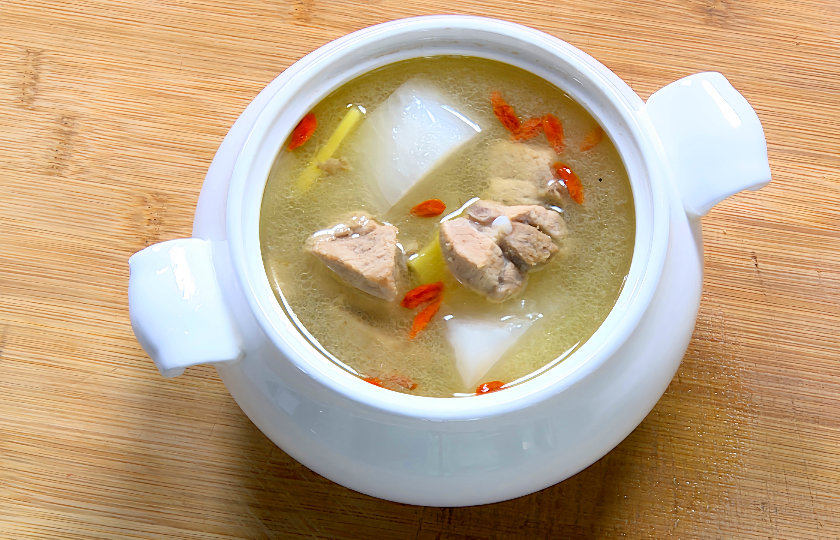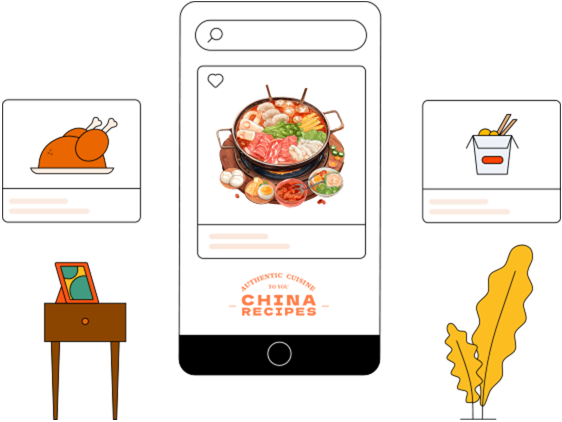Pork Ribs Soup with Radish


In a dry season, the body needs moisture. Pork Ribs Soup with Radish makes a glorious appearance. The sweet soup wraps around nutrition. Every mouthful is a gift of life.
Required raw materials and substitutes
Main ingredients
Pork ribs: The meat is tender, fresh and chewy. It is the main ingredient of soup.
Daikon radish: Sweet and refreshing, it absorbs oil and relieves greasiness. Paired with pork ribs, it makes the soup taste more abundant.
Accessories
Ginger: Sliced and used for stir-frying until fragrant. It removes fishy smell and enhances fragrance, and can effectively remove the fishy smell of pork ribs.
Goji berries: Play a decorative role and at the same time increase the nutritional value of the soup.
Seasonings
Oil: Used for heating the pan and stir-frying ginger slices and pork ribs, so that the ingredients can better release fragrance and blend into the soup.
Salt: Basic seasoning to control the saltiness of the soup.
White pepper: Adds a unique pepper aroma and removes fishy smell and enhances flavor.
Substitutes
Pork ribs: Spine bones can be substituted. The soup made with spine bones has a more mellow and rich taste and is rich in bone marrow.
Daikon radish: Wax gourd can be substituted. It has a refreshing taste when eaten and has the effect of promoting diuresis.
Goji berries: Red dates can be substituted. They are sufficiently sweet and can play a role in tonifying the middle and replenishing qi.
White pepper: Black pepper can be substituted. It has a relatively strong spiciness, and its aroma is different from that of white pepper.

What's the taste of Pork Ribs Soup with Radish?
This Pork Ribs Soup with Radish is delicious and palatable. The taste of the soup mainly comes from the sweetness of radish and the umami of pork ribs.
If you want the soup to be more nutritious, in addition to goji berries, you can also add some cilantro or chopped green onion for decoration at the end. In addition, for pork ribs, it is best to choose rib chops. The meat is tender and easy to absorb flavors, and the stewed soup will be more rich.
Which part of pork ribs is better for making this soup?
Rib chops are the best choice, especially the front rib chops with a certain amount of fat and lean. The meat of this part of pork ribs is tender, rich in collagen. After stewing, the soup is rich, and the meat is especially soft and tender.
Although the back rib chops can also be used, the meat is leaner and harder. It needs a longer time of stewing to become soft, and the soup produced is not as good as that from the front rib chops. Although keel and spine bones can also be used for making soup, there is more bone and less meat. In terms of taste, they are not as good as rib chops.
When purchasing, pay attention to the freshness of pork ribs. The color should be pink and shiny. It is best to choose those with uniform meat color and moderate fat and lean.
What should be noted when using a pressure cooker?
The most crucial points in using a pressure cooker are to control the heat and the amount of water. Start by using high heat to quickly increase the temperature. When the pressure valve starts to jump, turn to medium-low heat to ensure stable pressure. The amount of water should be controlled to be less than two-thirds of the pot.
Before using, check the sealing ring and exhaust valve to ensure that the pot lid can be tightly closed without any gaps. Otherwise, it is easy for steam to escape and affect the cooking effect. Timing should start from when the pressure valve begins to jump. Ten minutes is enough for stewing radish and pork ribs.
Before opening the lid, be sure to wait until the pressure is completely released and the pressure valve is completely lowered. If you want to be quicker, you can pour cold water on the pot lid to cool it down, but never be impatient and forcefully open it. It is very dangerous. Radish is easy to overcook. It is recommended to put it in only in the last five minutes so that it can maintain a complete shape.
INGREDIENTS
Main Ingredients
-
·300g pork ribs
-
·500g daikon radish
Additional Ingredients
-
·10g ginger
-
·A handful of goji berries
Seasonings
-
·15ml oil
-
·3g salt
-
·2g white pepper
Table of Contents
COOKING STEP
Step 1
Cut 300 grams of pork ribs into small pieces about 2 centimeters in size.

Step 2
Cut 500 grams of daikon radish into small pieces as well.

Step 3
Cut 10 grams of ginger into slices.

Step 4
Pour 300 milliliters of clear water into the pot and put the pork ribs in for blanching.

Step 5
When the water boils, take out the pork ribs and drain off the water.

Step 6
Put 15 milliliters of oil in the pot. After heating up, put the ginger slices in to stir-fry until fragrant.

Step 7
Pour in the pork ribs and stir evenly.

Step 8
Pour in 400 milliliters of clear water and add the daikon radish. Cover the pot.

Step 9
After the water boils, add 3 grams of salt and 2 grams of white pepper for seasoning.

Step 10
Pour them all into a pressure cooker. Cover the pot and pressure cook for ten minutes.

Step 11
After pressure cooking, pour the pork ribs and daikon radish back into the pot and add a handful of goji berries.

Step 12
Cover the pot and cook until it boils again. Then it can be served!

More recipes worth trying
Radish And Pork Ribs Soup Recipe
Chinese Herbal Chicken Soup Recipe
Recipe variations
Here are more interesting changes to Pork Ribs Soup with Radish:
Add dried scallops for enhanced umami: At the beginning of making the soup, directly throw about 10 dried scallops into the pot. Dried scallops are known for their freshness. When the soup is cooked, as soon as you taste it, you will know that the umami becomes extremely rich all of a sudden.
Add fruits for added sweetness: Cut two or three pears or apples into small pieces and directly put them into the soup to cook together. The sweetness of fruits can remove all the greasiness in the soup and also emit a faint fruity fragrance.
Add mushrooms for enhanced fragrance: Put some mushrooms like shiitake mushrooms and tea tree mushrooms into the soup. When these mushrooms are cooking in the pot, the fragrance continuously emerges, and the taste of the soup immediately becomes rich. All kinds of fragrances are mixed together, and it is extremely tempting just by smelling it.
Add coarse grains for satiety: Grab a handful of barley or gorgon fruit and put it into the soup to cook. After cooking, they will become soft and glutinous and absorb all the umami from the soup. These coarse grains not only make you feel full after drinking the soup but also make the whole soup healthier.
Eating suggestions
Staple food pairing:
Try pairing brown rice with Pork Ribs Soup with Radish. Brown rice is rich in dietary fiber and has a chewy texture. When eaten with the soup, it absorbs the delicious soup and becomes a bit softer while still retaining that chewy texture.
Side dish pairing:
A plate of shredded carrots mixed cold is very good. After being mixed cold, the shredded carrots are crisp and refreshing. They go well with the radish in the soup and make the vegetable varieties of this meal more diverse.
Eating method:
It's very simple when eating. Pour the Pork Ribs Soup with Radish directly on the rice and then gently stir. Let the rice be fully soaked in the soup, and the minced pork ribs and radish are evenly scattered in it.
Eat while it's hot:
When this soup is just out of the pot, steam is rising. The radish is cooked until very soft and mushy, and the pork ribs are also full of meat juice. The soup is extremely delicious. When it's cold, quickly have a bowl. The warmth goes from the mouth to the stomach, and immediately you will feel energetic all over.
FAQs:
When taking it out for use, drink it all at once. Repeated heating is prone to spoilage. If there are radish and pork ribs in the soup, it is recommended to store them separately so as not to affect the taste.
When reheating the soup, heat it slowly over low heat. Do not use a microwave oven to avoid nutrient loss. If you find that the soup has an abnormal smell or there are oil slick floating on it, do not eat it anymore. It is safer to dispose of it in time.
It is recommended that pork ribs are best controlled between 2 and 3 centimeters. This can not only ensure uniform heating but also facilitate absorption of flavors. If the pork rib pieces are too large, the pressure cooker time can be appropriately extended to 15 minutes, or cook for a few more minutes in the final step.
When cutting pork ribs, try to choose parts with more meat as much as possible to make the ratio of bone to meat more appropriate. In this way, the soup stewed will be more delicious, and the radish will also be more flavorful.
However, since the stock itself already has a certain degree of saltiness, when adding seasonings, the amount of salt should be appropriately reduced. You can add 1 gram first to taste and then adjust.
If you want the soup to have a more layered taste, you can use stock boiled from pig bones and chicken bones. But note that the stock is best freshly boiled. Avoid using stock that has been stored for too long to avoid affecting the taste of the soup.
Another way is to cut the radish into larger pieces, about 3 centimeters square. Larger pieces can better maintain their shape and texture. When cooking, use medium heat. When you see the soup boiling, you can turn off the heat because the remaining heat will continue to heat.
In addition, radish can be added in two batches. Put one-third of it and stew it with the pork ribs for the first time, and add the rest when the soup is almost ready. In this way, the soup can have more radish fragrance, and the radish added at the end will not be cooked too softly.

















